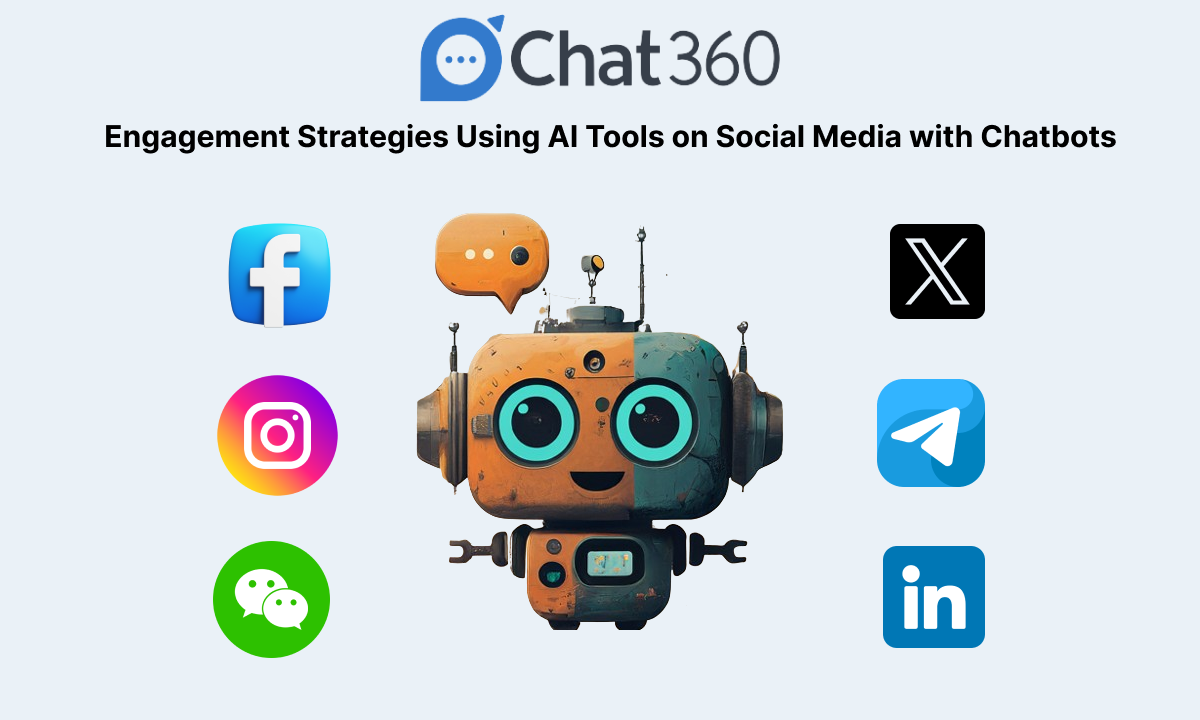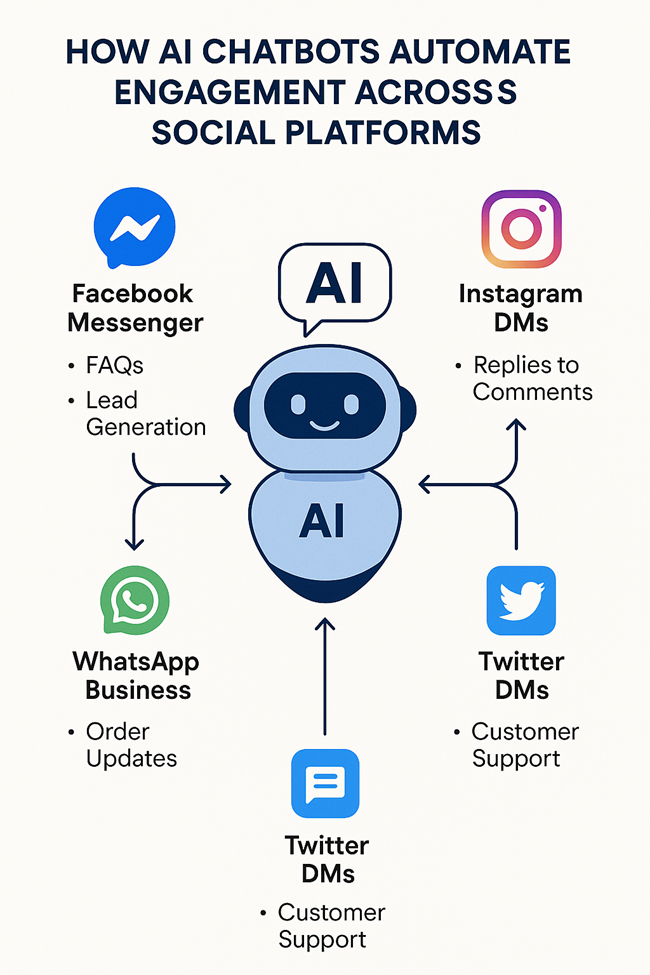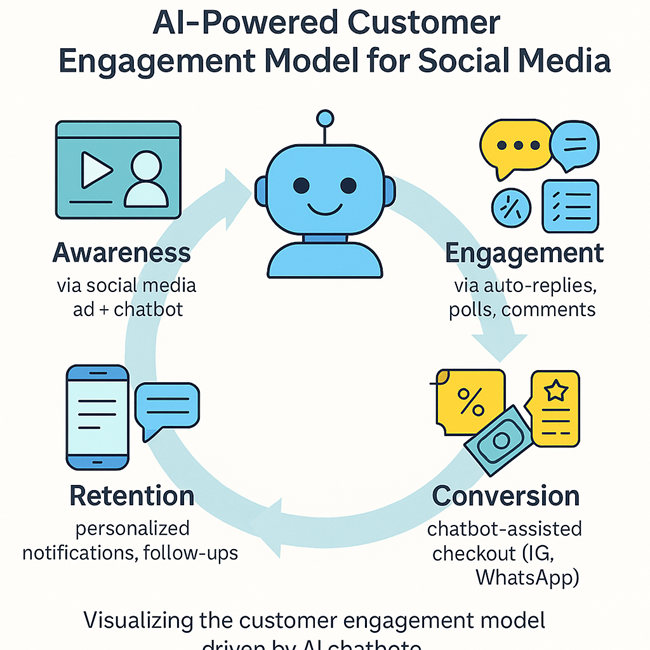
Business Chatbots for Social Media: Automate Customer Engagement
Business Chatbots for Social Media: Transforming Customer Engagement
Social media has become an essential space where businesses engage, interact, and build relationships with customers. With the increasing volume of customer queries and the need for instant responses, businesses are leveraging AI-powered chatbots to automate conversations, provide real-time support, and improve overall engagement.
Chatbots are no longer just a novelty; they are a necessity. From automating customer service to enhancing marketing campaigns, Chatbots have become a foundational element in building a modern customer engagement model, revolutionizing how brands interact with their audience. This blog explores how business chatbots for social media are revamp customer engagement and why companies must integrate them into their digital strategy.
The Rise of AI Chatbots in Social Media
The growing reliance on social media messaging platforms like Facebook Messenger, Instagram, WhatsApp, and Twitter has driven the adoption of AI-powered chatbots. Customers now expect businesses to respond instantly, making chatbots a crucial tool for:
- Providing 24/7 customer support
- Automating sales and lead generation
- Enhancing brand engagement
- Delivering personalized experiences
A study shows that 64% of consumers prefer messaging a brand over calling customer support. Businesses that fail to implement chatbot-driven communication risk losing potential leads to competitors who offer instant responses.
How Business Chatbots for Social Media Improve Engagement
1. Instant Customer Support & Query Resolution
A chatbot eliminates long wait times by answering frequently asked questions (FAQs) instantly. Whether it’s order tracking, booking appointments, or handling product inquiries, an online chatbot based ticketing system ensures customers receive instant responses with minimal friction. without waiting for a human agent.
For example, Sephora’s chatbot on Facebook Messenger helps customers schedule beauty consultations, making the experience more interactive and seamless.
2. Lead Generation & Sales Automation
In the context of customer relationship management in the service industry, chatbots guide users through personalized sales funnels while capturing lead data effectively. based on their preferences. AI-powered chatbots qualify leads by asking relevant questions and directing them to the right service or product.
Example: E-commerce brands integrate AI chatbots with product catalog management systems to help customers discover the right products through channels like Instagram DMs.
3. Personalized User Experiences
By integrating chatbots with AI, businesses can offer tailored recommendations based on customer interactions. Chatbots analyze previous interactions, purchase patterns, and preferences to track customer engagement activities and deliver tailored experiences.
For instance, Spotify’s chatbot on Facebook Messenger curates personalized playlists based on user preferences.
4. Seamless Social Media Integration for Marketing
Chatbots can be used in social media ad campaigns to interact with users in real time. Instead of clicking on an ad and landing on a website, users can engage directly through a chatbot, making marketing efforts more interactive and effective.
For example, Domino’s Pizza uses Twitter bots to take orders and track deliveries, providing a hassle-free customer experience.
5. AI-Powered Conversational Commerce
With the rise of conversational commerce, chatbots are helping businesses sell products through messaging apps. Many businesses simplify in-chat transactions by using [payment gateway integration in PHP], ensuring secure and smooth payment experiences.—all within the chat interface.
A real-world example is H&M’s chatbot, which offers styling suggestions and lets users complete purchases without leaving the app.
Best Social Media Platforms for Chatbot Integration

1. Facebook Messenger Chatbots
- Automates customer service, FAQs, and product recommendations.
- Enhances engagement with interactive conversations.
- Drives sales by integrating with e-commerce platforms.
2. Instagram DM Chatbots
- Handles inquiries via DMs and automates replies to comments.
- Assists with shopping recommendations through Instagram Shops.
- Engages followers with quizzes, polls, and promotions.
3. WhatsApp Business Chatbots
- Processes orders, provides support, and handles reservations.
- Sends personalized updates, offers, and reminders.
- Supports secure in-chat payments for seamless transactions.
4. Twitter Chatbots
- Automates responses to mentions and direct messages.
- Provides customer service updates in real time.
- Engages with users through interactive campaigns.
Benefits of Using Chatbots for Social Media

24/7 Customer Support – No wait times, faster query resolution.
Higher Engagement Rates – Real-time interactions boost customer satisfaction.
Better Lead Generation – AI chatbots collect data and qualify leads.
Increased Conversions – Chatbots drive sales through conversational commerce.
Cost Savings – Reduces dependency on human agents, lowering operational costs.
Future of Chatbots in Social Media Marketing
As AI and NLP (Natural Language Processing) technologies advance, chatbots will become even smarter, offering:
- Voice-enabled AI chatbots for hands-free interactions.
- Emotionally intelligent bots that recognize user sentiment.
- Seamless omnichannel automation across websites, apps, and social media.
Businesses that embrace chatbot technology today will lead the future of social media-driven customer engagement.
Final Thoughts: Why Your Business Needs Social Media Chatbots
Integrating business chatbots for social media is no longer optional—it’s a necessity for brands looking to scale customer interactions, increase engagement, and boost revenue. AI chatbots provide a seamless, efficient, and cost-effective way to manage customer queries, automate sales, and enhance marketing efforts.
Key Takeaways:
- Chatbots revolutionize customer service & sales on social media.
- They provide instant responses, personalized interactions & automation.
- Future AI chatbots will offer even more intelligent and human-like interactions.
By 2025, businesses that invest in AI chatbots will have a competitive advantage in delivering fast, intelligent, and engaging customer experiences.
Frequently Asked Questions (FAQs)
1. What is a customer engagement model, and how do chatbots support it on social media?
A customer engagement model outlines how businesses interact with their audience across different touchpoints. On social media, AI-powered chatbots enhance this model by offering real-time conversations, personalized responses, and automated support that keeps users engaged without delays.
2. How does an online chatbot based ticketing system work on platforms like Facebook or WhatsApp?
An online chatbot-based ticketing system automatically converts customer queries into support tickets. On platforms like Facebook Messenger or WhatsApp, it assigns priority, sends updates, and ensures issues are resolved faster—without needing a human agent for every step.
3. Why is customer relationship management in the service industry adopting social media chatbots?
In the service industry, managing customer relationships effectively means being responsive and consistent. Social media chatbots help automate FAQs, streamline booking or query processes, and deliver a personalized customer journey—essential for modern customer relationship management in service-focused businesses.
4. Can chatbots handle product catalog management for e-commerce through social channels?
Yes, many AI chatbots integrate with your e-commerce backend to enable real-time product catalog management. Customers can browse products, view recommendations, and even make purchases directly through Instagram DMs, Facebook Messenger, or WhatsApp.
5. Is payment gateway integration in PHP relevant to chatbot transactions?
Absolutely. If you're using a custom chatbot or backend built in PHP, integrating a secure payment gateway is crucial. It enables seamless in-chat payments, improving customer experience and boosting conversions directly within platforms like WhatsApp or Facebook Messenger.
6. What types of customer engagement activities can be automated through chatbots?
Chatbots can automate a range of customer engagement activities including lead qualification, survey collection, quiz interaction, feedback requests, personalized offers, order tracking, and real-time notifications—enhancing both user satisfaction and operational efficiency.